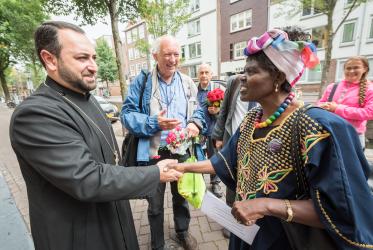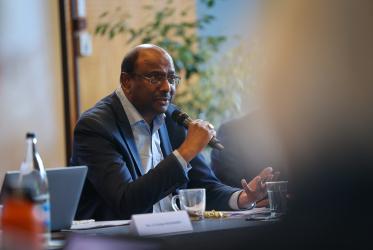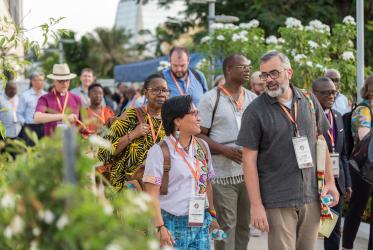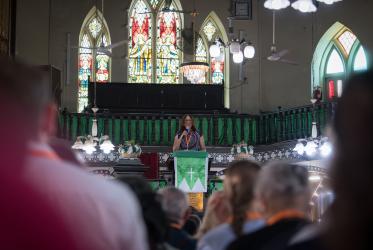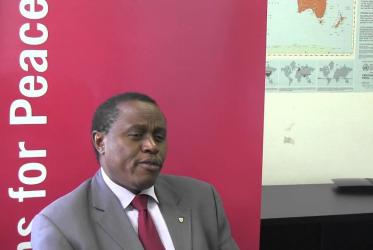By Claus Grue *
In a followup interview with CCA general secretary Dr Mathews George Chunakara, he reflects back on an assembly with which he was pleased and which he thinks worked out very well in terms of organization, participation, content, decision-making, and logistics, as well as the overall outcome of the assembly and its expected results: “The 15th General Assembly provided a perfect setting for us to come together in a common platform for worshiping, reflecting, renewing friendships, and strengthening bonds. At the same time, it offered excellent opportunities to review programmes implanted during the past eight years, and learn from past experiences, as well as discuss emerging challenges in a pluralistic Asian context and identify priorities for setting future programme thrusts,” he explains.
Close ecumenical ties
In his opening speech, Chunakara extended a special welcome to the general secretary of the World Council of Churches (WCC), Rev. Prof. Dr Jerry Pillay, who had graciously accepted CCA’s invitation to inaugurate the assembly and deliver the keynote address on the assembly theme.
“It was a privilege and honour for us to welcome the highest-ranking leader of the global ecumenical movement. His keynote address resonated splendidly with the theme of the assembly and provided a perfect framework for further contemplation,” Chunakara says.
In the following days, plenty of ideas emanated from seminars and deliberative sessions, which gave impetus to move forward. The next step now is to filter down and synthesize the most potent ideas into concrete priorities for implementation through CCA programmes. A tentative programme plan will be shared with the members of the CCA executive committee before Christmas break, or early next year. The executive committee will then appoint a new programme committee, which will look at practical aspects in order to facilitate implementation of programmes and activities, starting from the first quarter of 2024.
Embracing local ecumenism
The CCA General Assembly in Kottayam, India, represented a new approach in several ways. The location in a small city in the state of Kerala in southwestern India provided an excellent opportunity to blend local and global ecumenism. In an effort to widen the ecumenical outlook in Asia beyond densely populated areas, representatives of churches from around the world were welcomed by local congregations in 70 parishes from five different denominations, as well as Indigenous and hill tribe-area communities, to services in rural settings around Kottayam on Asia Sunday, 1 October – a special day for ecumenism in Asia, which is observed across the continent and which this year shared the theme of the CCA assembly. Special side events were also organized by local member churches to welcome their overseas ecumenical guests.
“Previous assemblies have mostly been held in capital cities, such as Bangkok, Kuala Lumpur, Manila, Colombo, Jakarta, and Seoul. This location enabled us not only to provide a convenient ambiance for the supreme governing body of the CCA for its assembly, but also to offer unique experiences, where assembly participants got the opportunity to worship in rural environments around the assembly venue Kottayam, and learn more about the spiritual life and liturgical worship services of different church traditions, as well as their ecumenical work in rural settings,” Chunakara explains.
At the same time, local congregations, in and around Kottayam, felt that they were part of the worldwide ecumenical movement in a very concrete way as they could welcome and host their counterparts from different countries in their local congregations. The preparations and arrangements made by the host churches in Kerala thus provided opportunities for the members of different churches to come together in an ecumenical platform under the banner of CCA.
That arrangement, made by the local host committee consisting of different churches, has been widely praised, both by assembly participants and the local congregations involved.
In-depth deliberations on Asian realities
Another new feature was the so-called “Churcha-sessions,” described in the assembly programme as “deliberative and discursive spaces for ecumenical dialogue on emerging and pressing theological, missiological, socio-economic and geopolitical concerns.” Fifteen key topics, directly or indirectly related to the assembly theme and sub-themes, were thoroughly explored in group sessions, generating concrete recommendations for action by the CCA and the wider ecumenical community in Asia.
The Asian Ecumenical Festival, providing a common platform for presenting cultural diversities, became another unique experience for blending local and regional perspectives. With a geographical span from Iran in the west to Japan in the east and from Nepal in the north to Aotearoa New Zealand in the south, CCA covers an incomparably large, populous, and culturally diverse part of the world. The festival initiative set the tone for similar opportunities to be organized as part of future assemblies.
Emerging concerns and challenges
Along with praying and networking, the reviewal of past activities and staking out future directions are core components of an assembly. Many of the concerns addressed in previous CCA programmes remain valid, such as climate change, strengthening ecclesial unity, ecumenical formation, human trafficking, and migration, as well as interreligious peacebuilding initiatives and advocacy dialogue.
The CCA general secretary views politicisation of religion and religionization of politics as major reasons for ongoing disharmony and religious intolerance in several places in Asia, such as Pakistan, Iran, India, Bangladesh, Sri Lanka, Myanmar, Indonesia, and southern Thailand. He is profoundly worried about the growing trends he is witnessing of ethnic and religious conflicts, sectarian strife, and persecution against religious minorities in Asia.
“The lack of interreligious understanding is at the core of this conflict and must be addressed in a spirit of tolerance and harmonious living together,” he points out.
The extraction of natural resources, often with the support of local or national governments, is another challenge, directly related to protecting the integrity of creation. Another growing concern is migration and its impact at various levels, particularly from the south and southeast Asian countries, where more and more elderly people now are left behind in solitude, as their well-educated children migrate abroad to countries with more attractive job markets and employment opportunities.
“It has become a challenge for many of our member churches to take care of these lonely and left behind parents’ needs, and provide them pastoral care. The emergence of aggressive missionary evangelism and church planting activities by Christian fundamentalist groups give us reason to worry that elderly people are being lured to switch their denominational or confessional membership from mainline churches to newly created para-churches,” Chunakara warns.
Turning a crisis into an opportunity
Amid growing concerns, along with the ramifications of the pandemic, the CCA has managed to maintain consistency in its programmatic activities and mobilize the necessary resources to implement them. Several concerns on the agenda have been dealt with as planned through online platforms during the lockdown situations.
“In one sense, we’ve turned a crisis situation into an opportunity by taking advantage of new technology. That has opened up new and efficient ways of working,” Chunakara points out.
According to the CCA general secretary’s report to the assembly, a growing sense of ownership by member churches and councils has emerged in recent years.
All in all, a total of 224 programmes were organized in the past eight years, of which almost 9,700 people from various Asian countries attended. Particularly noteworthy is the large-scale growing number of women and young people participating in these programmes during the post-Jakarta assembly period – a development Chunakara enthusiastically describes as “unprecedented in the history of CCA.”
Setting up a permanent headquarters
Returning to its temporary headquarters in Chiang Mai, Thailand, after a productive assembly, the CCA leadership faces an urgent practical challenge in identifying a permanent location for its operation. Mounting problems related to visa regulations, work permits, bank transaction services, and an array of restrictions introduced by governments warrant a new location for CCA’s headquarters. The CCA executive committee therefore will have to explore alternative locations, where banking systems allow multi-currency operations, where costs still are reasonable, and where it is easier for staff recruited from different countries in Asia to be stationed and travel across Asia for organising programmes in CCA’s constituencies.
Ready for responding to Asia’s emerging challenges
With its 15th assembly successfully carried out and a fresh agenda set, the CCA is ready to take up issues and respond to emerging challenges with a particular focus on renewal and restoration of creation.
“We have been called to be prophetic witnesses in a changing Asian context and respond to the emerging situation as part of our Christian faith. We believe that the purpose of God for the church in Asia is life together in a common obedience of witness to the mission of God in the world. In this context, it is pertinent that CCA is called to address the manifold challenges amidst Asia’s emerging realities as part of its faith, vision, and mission,” Chunakara. concludes.
*Claus Grue is a senior communication consultant for the World Council of Churches.










